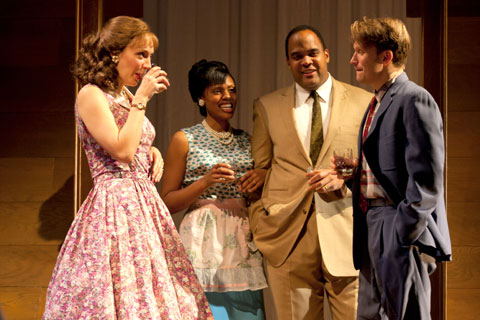
REAL VALUE Kirsten Greenidge's Luck of the Irish explores the ramifications of race and real estate over the course of three generations of Boston families. |
"There is more than one way to view A Raisin in the Sun. Like Bruce Norris's 2011 Pulitzer-winning Clybourne Park, Kirsten Greenidge's The Luck of the Irish looks at Lorraine Hansberry's landmark 1959 drama both straight on and through the rear-view mirror. But unlike Clybourne Park, which blatantly hitches itself to Raisin, Greenidge's feisty yet lyrical work, in its world premiere by the Huntington Theatre Company (at the Calderwood Pavilion through May 6), drives its own car.
The spark of the play was Greenidge's grandparents' move, in the 1950s, from the mostly black South End of Boston to an all-white neighborhood in Arlington. They used a Jewish family friend as a ghost buyer, so as to avoid the obstacles likely to manifest themselves were it known that the buyers were black. In Greenidge's play, however, the bait-and-switch is simply a business transaction: an African-American doctor and his wife, feeling "stacked up like pancakes" in the city and wanting better educational opportunities for their kids, pay a down-on-their-luck Irish-American couple to enact their purchase. But that trick, not uncommon at the time, is not what the play's about. Jumping back and forth between the '50s and early 2000s, Greenidge explores the ramifications, over generations, of endeavoring to feel comfortable in your skin in a milieu you fear isn't comfortable with your skin.
As the play begins, in a backyard that slopes up into the burnished frame of a large suburban home, Rex and Lucy Taylor, the couple who bought the place in the '50s, have recently died. Their granddaughters, who grew up there, are throwing a memorial picnic. One of them, Hannah, has recently moved back into the house with her husband and kids. Intruding on the festivity, however, is the couple who acted as the elder Taylors' straws — first in the form of an uneasy old gent whose wife is waiting in the car, then as the young pair who were sufficiently hard up to help another couple to a dream they themselves could not afford.
The early, interlaced scenes are a bit confusing. Several motifs that will prove important — among them the Robert Frost poem "Mending Wall" — are introduced while the audience is still getting its bearings. The play shapes up swiftly, though, into a complicated skein in which racial resentment and paranoia never quite go away. Even as Hannah grows increasingly agitated by what she perceives as condescending treatment of her hyperactive son by a still overwhelmingly white community, she is harassed by missives from old Mrs. Donovan asserting that she and her spouse still own the house.
But Greenidge piles believable human comedy and drama onto her social agenda. And the Huntington cast, under Melia Bensussen's able direction, proves persuasive and appealing (except for the excellent Nancy E. Carroll, whose disappointed old Mrs. Donovan is as grim as any reaper). The badinage between sisters Hannah and Nessa, played by Francesca Choy-Kee and Shalita Grant, is infectious. Choy-Kee also conveys the mounting strain that threatens Hannah's marriage and equilibrium, and Curtis McClarin contributes empathy and sauciness as her less baggage-burdened husband, Rich. Nikkole Salter brings pride, chic, and a definite edge to progenitor Lucy. Victor Williams is a commanding Rex, Richard McElvain a sadly spent Mr. Donovan. And a sparky Marianna Bassham and dreamy McCaleb Burnett are terrific as the mismatched young Donovans, as "neck-deep" in yearning as in financial woe.